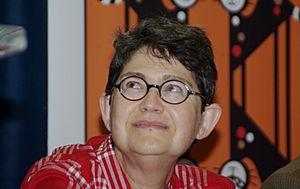Chely Lima facts for kids
Chely Lima (1957 – January 21, 2023) was a talented writer, poet, and artist from Cuba who later lived in the United States. He also worked as a photographer, editor, and screenwriter.
Contents
A Life of Creativity
Chely Lima was born in Havana, Cuba, in 1957. His father was a doctor. Chely studied in Havana, even learning Japanese at a language institute.
In 1978, he started working at the Cuban Institute of Cinematographic Art and Industry. The next year, he began writing for a music and news show on the radio.
Working with Alberto Serret
In 1979, Chely met another writer named Alberto Serret. They became partners and worked together on many creative projects. Their friend, Sigfredo Ariel, said it was hard to tell where Chely's work ended and Alberto's began because they collaborated so closely.
In 1980, Chely and Alberto moved to Isla de la Juventud. There, Chely worked with a children's theater group and as a literary advisor. He also became an editor for a literary magazine.
Early Books and Awards
Chely's first book of poems, Tiempo nuestro (Our Time), came out in 1981. It had won the 13 de Marzo Prize from the University of Havana the year before. In 1982, he published a book of stories called Monólogo con lluvia (Monologue with Rain), which also won an award called the David Prize.
In 1983, Chely and Alberto wrote their first science fiction book together, Espacio abierto (Open Space). They also wrote their first play, Retratos (Portraits), which was published in 1984.
TV Shows and Rock Opera
In 1986, Chely and Alberto started writing TV scripts for a series called Del lado del corazón (On the Side of the Heart). The next year, they created Violente, which was the very first Cuban rock opera.
Chely won the 13 de Marzo prize again in 1987 for his children's book, El barrio de los elefantes (The Neighborhood of the Elephants). That same year, he also helped write a TV series called Hoy es siempre todavía (Today is Still Always) with Alberto Serret and other writers. This show also won several awards.
In 1990, Chely and Alberto wrote a book of crime stories together. They also released a musical piece called Señor de la alborada (Lord of the Dawn). In 1991, Chely published his first novel, Brujas (Witches).
Life in Ecuador
In February 1991, Chely moved to Ecuador with Alberto. He worked on many projects there, including for TV and radio. He was an editor for Ecuadorian newspapers like Hoy, El Comercio, and La Hora. He also taught writing classes at universities.
He published more novels in Mexico in 1994. That year, he also started working for the Ecuadorian TV channel Ecuavisa. He and Alberto wrote several TV miniseries, including El Chulla Romero y Flores (1995) and Solo de guitarra (1997). From 1997 to 2003, he was part of the writing team for the series Pasado y confeso (Past and Confessed). In 1998, Chely won the Juan Rulfo Prize for Children's Literature for his story El cerdito que amaba el ballet (The Piglet Who Loved Ballet).
Moving to the United States
After 22 years together, Alberto Serret passed away in 2001. Chely stayed in Ecuador for a few more years, working on projects like a play called Tres historias de hotel (Three Hotel Stories).
In 2003, Chely moved to Buenos Aires, Argentina. There, he joined the writing team for a TV show and taught scriptwriting. In 2006, he wrote a film script based on one of his novels.
Later in 2006, Chely moved to the United States. He first lived in San Francisco and then moved to Miami in 2008. In Miami, he taught creative writing and screenwriting workshops at Miami-Dade College.
Chely Lima passed away in Miami, Florida, in 2023 at the age of 66. He was a man who believed strongly in individual freedom and fought against prejudice.
Creative Works
Chely Lima wrote many different kinds of books and scripts. Here are some of his works:
Poetry
- 2017: What the Werewolf told them
- 2013: Discurso de la amante (The Lover's Speech)
- 1981: Tiempo Nuestro (Our Time)
Fiction
- 2016: Triángulos mágicos (Magic Triangles)
- 2015: Lucrecia quiere decir perfidia (Lucrecia Means Perfidy)
- 1994: Confesiones nocturnas (Night Confessions)
- 1991: Brujas (Witches)
- 1983: Espacio abierto (Open Space) – with Alberto Serret
Juvenile Fiction (for young readers)
- 2010: El planeta de los papás-bebés (The Planet of the Baby Dads) – with Sergio Andricaín
- 1998: El cerdito que amaba el ballet (The Piglet Who Loved Ballet) – Juan Rulfo Prize-winner
- 1987: El barrio de los elefantes (The Neighborhood of the Elephants)
Theater
- 2001: Tres historias de hotel (Three Hotel Stories)
- 1987: Violente (rock opera) – with Alberto Serret
Film, Television, and Radio
- 2006: Filo de amor (Edge of Love) – film script
- 1997–2002: Pasado y confeso (Past and Confessed) – TV series
- 1995: Siete lunas, siete serpientes (Seven Moons, Seven Serpents) – TV miniseries
- 1987: Hoy es siempre todavía (Today is Still Always) – TV series
See also
 In Spanish: Chely Lima para niños
In Spanish: Chely Lima para niños
 | Claudette Colvin |
 | Myrlie Evers-Williams |
 | Alberta Odell Jones |


